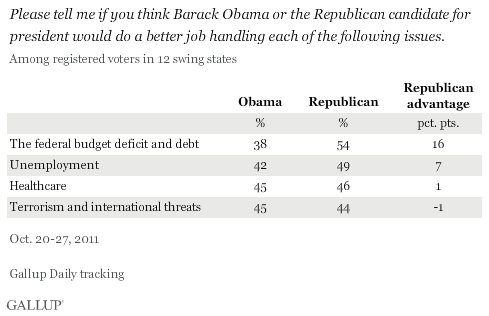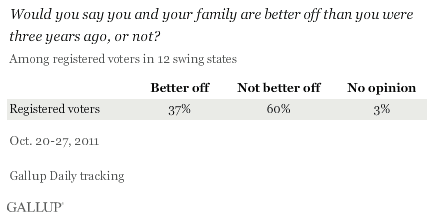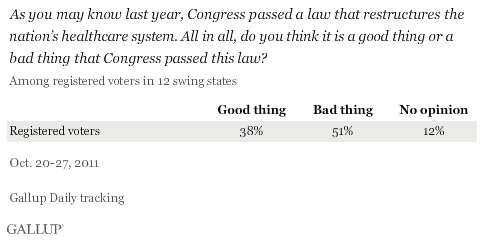PRINCETON, NJ -- Voters in 12 key swing states are substantially more likely to feel that a generic "Republican candidate" for president would do a better job than President Obama of handling the federal deficit and debt, and are slightly more likely to prefer the Republican on the issue of unemployment. Swing-state voters are split on the question of whether Obama or the Republican candidate would do a better job of handing healthcare as well as terrorism and international threats.

These "swing state" results are from the first USA Today/Gallup Swing States poll, based on Oct. 20-27 Gallup Daily tracking in 12 states that will be among the most crucial to winning the 2012 presidential election. The states include Colorado, Florida, Iowa, Michigan, Nevada, New Hampshire, New Mexico, North Carolina, Ohio, Pennsylvania, Virginia, and Wisconsin. Obama and the leading Republican candidates are competitive in terms of registered voter support in these states, and Republicans in these states are more enthusiastic about voting than are Democrats.
Economy Most Important Issue in Swing States
Obama's relative weakness on unemployment is potentially the most important of the four issues measured in this survey, given that 90% of voters in these swing states rate the condition of the national economy as "only fair" or "poor," and 72% say the economy is getting worse. Gallup has also found that nationally, Americans overwhelmingly name economic issues as the country's most important problem, as do national adults living in these 12 swing states.
Additionally, 60% of swing-state voters say they and their families are not better off than they were three years ago -- when Obama was elected president -- while 37% say they are.

This question is a derivative of the one Ronald Reagan posed to the nation as he ran for office against incumbent Jimmy Carter in 1980. Gallup has asked this question of the American public in several election years since 1980, and the responses have turned out to be related to presidential election outcomes. In 1992, 46% of Americans said they were worse off, while 38% said they were better off -- and challenger Bill Clinton went on to defeat incumbent George H.W. Bush in the November 1992 election. In 1984 and 2004, by contrast, more Americans said they were better off than worse off, and both of the incumbents -- Ronald Reagan and George W. Bush -- won.
Obama's relatively poor positioning on the deficit most likely reflects Americans' general association of the Democratic Party with government spending, and the Republican Party with efforts to cut back on spending. Few Americans name the deficit as the nation's top problem, however, so it is unclear how important Obama's weak positioning on this issue will be in the presidential campaign.
Majority of Swing-State Voters Say Healthcare Bill a "Bad Thing"
Republicans in general and the Republican presidential candidates more specifically have continuously criticized the national healthcare bill passed in early 2010 and signed into law by President Obama, and have made repeated calls for its repeal. This campaign theme in theory could play well in the 12 swing states, where, by 51% to 38%, registered voters say the passage of the healthcare bill was a bad thing rather than a good thing.

At the same time, Obama ties the generic Republican candidate when swing-state voters are asked who would do the better job of handling healthcare, possibly suggesting that Obama has some residual strength on this dimension -- despite his association with the unpopular bill.
Terrorism Not a Prominent Swing-State Issue, but Obama Has Good Footing on It
Obama's relative parity among swing-state voters on the issue of terrorism and international threats is a shift in positioning for a Democratic presidential candidate. The ability to handle terrorism was a continuing position of strength for President George W. Bush after the Sept. 11, 2001, terrorist attacks, and Americans perceived the Republican presidential candidate John McCain as better able than Obama to handle terrorism in the 2008 campaign.
In recent months, however, Obama has been associated with a string of successes relating to the war on terrorism and international threats, including the killing of Osama bin Laden by U.S. Navy SEALs, the killing of other al Qaeda leaders, and the recent capture and death of deposed Libyan leader Moammar Gadhafi. While a candidate's perceived ability to handle terrorism threats will most likely not be as salient a campaign issue as the economy next year, it certainly will not hurt the Obama campaign to have erased a more typical Democratic deficit on this issue. None of the leading Republican candidates for president has unusually strong credentials on foreign policy or terrorism.
Bottom Line
The presidential election is now one year away, and President Obama currently does less well in the minds of swing-state voters than a generic Republican candidate on the issues of unemployment and the federal budget deficit. Given that the economy in general and jobs in particular are the most important issues on Americans' minds, this represents a challenge for the president's re-election campaign. Obama's advisers are well aware of these facts, of course, and the president has been focusing on jobs and his proposed Jobs Act in almost every campaign speech he has delivered in recent months.
Any incumbent president is inevitably yoked to the status of the current economy, so whether Obama gains or loses strength on this dimension in the presidential campaign will depend to a significant degree on how Americans perceive the economy over the next year.
Additionally, the questions from this initial swing-states survey pit Obama against "the Republican candidate for president" rather than a specific candidate, and Gallup's research indicates that Obama does better against specific candidates than he does against a generic candidate. Thus, when the Republican nominee is known, it's possible that Obama will be better positioned on these economic dimensions than these data would indicate.
Obama's equal footing with the generic Republican candidate on handling terrorism and handling healthcare suggest that his campaign may be able to neutralize these as potential winning issues for the Republican candidate in the swing-states campaign to come.
Survey Methods
Results for this swing-state sample are based on telephone interviews conducted Oct. 20-27, 2011, on the Gallup Daily tracking survey, with a random sample of 1,334 adults, aged 18 and older, living in Colorado, Florida, Iowa, Michigan, Nevada, New Hampshire, New Mexico, North Carolina, Ohio, Pennsylvania, Virginia, and Wisconsin, selected using random-digit dial sampling.
For results based on the total sample of "swing state" residents, one can say with 95% confidence that the maximum margin of error is ±3 percentage points.
For results based on the total sample of 1,169 registered voters in swing states, one can say with 95% confidence that the maximum margin of error is ±4 percentage points.
The data represent a subset of Gallup's national Daily tracking survey for Oct. 20-27, and are proportionate to population size of each state. Samples are weighted by gender, age, race, Hispanic ethnicity, education, region, adults in the household, phone status (cell phone only/landline only/both, having an unlisted landline number, and cell phone mostly). Demographic weighting targets are based on the March 2010 Current Population Survey figures for the aged 18 and older non-institutionalized population living in telephone households in the 12 swing states. All reported margins of sampling error include the computed design effects for weighting and sample design.
The weighted and unweighted sample sizes for each state are shown here:
|
Unweighted |
Weighted |
Weighted |
|
| % | |||
|
Colorado |
94 |
81 |
6 |
|
Florida |
192 |
257 |
19 |
|
Iowa |
64 |
50 |
4 |
|
Michigan |
126 |
147 |
11 |
|
Nevada |
35 |
38 |
3 |
|
New Hampshire |
27 |
22 |
2 |
|
New Mexico |
38 |
29 |
2 |
|
North Carolina |
128 |
132 |
10 |
|
Ohio |
151 |
169 |
13 |
|
Pennsylvania |
245 |
204 |
15 |
|
Virginia |
130 |
115 |
9 |
|
Wisconsin |
104 |
90 |
7 |
Interviews are conducted with respondents on landline telephones and cellular phones, with interviews conducted in Spanish for respondents who are primarily Spanish-speaking. Each sample includes a minimum quota of 400 cell phone respondents and 600 landline respondents per 1,000 national adults, with additional minimum quotas among landline respondents by region. Landline telephone numbers are chosen at random among listed telephone numbers. Cell phone numbers are selected using random-digit-dial methods. Landline respondents are chosen at random within each household on the basis of which member had the most recent birthday.
Samples are weighted by gender, age, race, Hispanic ethnicity, education, region, adults in the household, and phone status (cell phone only/landline only/both, cell phone mostly, and having an unlisted landline number). Demographic weighting targets are based on the March 2010 Current Population Survey figures for the aged 18 and older non-institutionalized population living in U.S. telephone households. All reported margins of sampling error include the computed design effects for weighting and sample design.
In addition to sampling error, question wording and practical difficulties in conducting surveys can introduce error or bias into the findings of public opinion polls.
View methodology, full question results, and trend data.
For more details on Gallup's polling methodology, visit www.gallup.com.
